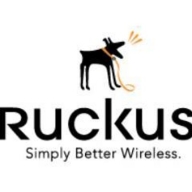

Cisco Wireless and Ruckus Wireless both compete in the enterprise wireless solutions market. Cisco Wireless has the upper hand in terms of robust security, integration, and advanced capabilities, while Ruckus Wireless shines in ease of deployment and reliability in challenging environments.
Features: Cisco Wireless offers unparalleled security and integration features with scalability and centralized management, supported by advanced technologies like Cisco CleanAir and DNA for interference management, making it ideal for large organizations. Ruckus Wireless focuses on user-friendly deployment and coverage with its BeamFlex technology, which optimizes the signal direction based on the client's location, providing a significant advantage in challenging environments.
Room for Improvement: Cisco Wireless users are looking for better affordability, user-friendly reporting tools, and smoother integration with third-party solutions due to its high cost and complexity. Ruckus Wireless, while competitively priced, requires enhancement in cloud-based management, technical support, and analytics to better satisfy enterprise-level demands.
Ease of Deployment and Customer Service: Cisco Wireless offers extensive capabilities but requires high technical expertise, which can be a barrier for smaller IT teams. Its customer service is reliable, though sometimes criticized for slow response times. Ruckus Wireless stands out for its simplicity in deployment and ease of setup, efficiently suiting quick implementation needs. Its customer service is noted for being prompt and accessible, particularly beneficial for smaller organizations.
Pricing and ROI: Cisco Wireless is on the higher end of the pricing spectrum; the extensive features justify the cost, but users report that the total cost of ownership is significant due to additional licensing fees. Ruckus Wireless provides more budget-friendly options with flexible licenses, often seen as offering better value due to superior coverage that reduces the number of required access points, thus improving ROI.
| Product | Market Share (%) |
|---|---|
| Ruckus Wireless | 13.8% |
| Cisco Wireless | 11.0% |
| Other | 75.2% |


| Company Size | Count |
|---|---|
| Small Business | 75 |
| Midsize Enterprise | 42 |
| Large Enterprise | 74 |
| Company Size | Count |
|---|---|
| Small Business | 69 |
| Midsize Enterprise | 21 |
| Large Enterprise | 25 |
Cisco Wireless is a comprehensive suite of wireless solutions designed to deliver secure, high-performance connectivity for enterprises of all sizes. Offering a range of access points, controllers, and advanced management tools, Cisco Wireless ensures seamless and reliable network access, enhancing mobility and productivity.
Cisco Wireless solutions provide robust, scalable wireless networks capable of supporting high-density environments and diverse applications. With features such as seamless roaming, advanced security protocols, and detailed analytics, Cisco Wireless addresses the needs of modern businesses. The solutions include the Cisco Catalyst and Aironet series access points, wireless LAN controllers, and the Cisco DNA Center for centralized management and automation.
What are the key features of Cisco Wireless?
What benefits should users look for in reviews when evaluating Cisco Wireless?
Cisco Wireless solutions are implemented across various industries, including healthcare, education, retail, and manufacturing. In healthcare, they support critical applications like patient monitoring and electronic health records. Educational institutions use Cisco Wireless to provide reliable internet access for students and staff. Retailers benefit from enhanced customer experiences through in-store connectivity, while manufacturers use wireless networks to improve operational efficiency and automation.
Pricing and licensing for Cisco Wireless solutions are typically based on the scale of deployment and specific product selections. Cisco offers various support plans, including 24/7 customer service, technical support, and access to software updates and patches.
In summary, Cisco Wireless provides robust, scalable wireless networking solutions that enhance connectivity, security, and management for diverse enterprise environments.
Ruckus Wireless is part of Ruckus Networks/Commscope and provides reliable wireless network solutions and services to large venues, schools, hotels, hospitals, malls, and public spaces (and more) worldwide.
Wireless access is an integral necessary part of today’s modern, fast-paced lifestyle. It is essential that dependable, safe wireless capabilities be available in most of today’s largely populated public spaces. Ruckus Wireless is the trusted industry leader in assisting organizations of all sizes to provide wireless access throughout their locations, both inside their physical structures and adjacent open outdoor areas.
Ruckus Wireless empowers users to design and create a wireless network across their organizational space to ensure that wireless coverage is available consistently to anyone who needs it. Ruckus can handle anything from homes and small to medium-sized businesses to hospitals, college campuses, airports, malls, stadiums and more. Ruckus also has excellent options for outdoor wireless networks. Many users choose Ruckus Wireless for broad extensive outdoor use. The solution offers excellent durable outdoor access points and a very robust, super fast, reliable Wi-Fi. Each and every access point is very powerful, and the outdoor access points can be very easily disguised to keep the network secure.
Another strong point is that Ruckus technology is based on frequencies. If there is ever any type of wireless interference, Ruckus Wireless can change frequency automatically so there are never any interruptions. Users also have the option to block outside access points and signals that may interfere with their network and make their network the only one that people can see within the network. Users can additionally whitelist certain networks if desired.
Ruckus uses the latest next-gen Wi-Fi, Wi-Fi 6, ensuring that more devices can be handled with greater speed and continuity. With Ruckus, users have great control over network traffic. They can also allocate the amount of bandwidth network users are granted based on their status - eg., guest, corporate, etc. - and give users priority on the network based on their status. Ruckus also has mesh and beamforming capabilities, which are recognized as a valued feature for many users.
Ruckus Wireless is robust, extremely reliable, very easy to deploy, and offers amazing coverage and rock solid connectivity. It is very easy to add additional access points across the network. Ruckus Wireless is very easy to use and manage using an app on any mobile device.
Reviews from Real Users
A Director Engineering & New Business at a comms service provider says Ruckus “provides superior coverage and is very dependable”
Sintayehu A., Director Of Information Communication Technology at Dire Dawa University, relates that "Ruckus Wireless supports the most recent technologies. We can trace every individual and what kind of traffic they're using on our campus. It is very helpful."
Philip S., Independent Consultant - Wireless, says, "The solution is very stable. I've worked with it at a hospital before, where we deployed it all over the hospital. It worked everywhere and continuously worked flawlessly."
We monitor all Wireless LAN reviews to prevent fraudulent reviews and keep review quality high. We do not post reviews by company employees or direct competitors. We validate each review for authenticity via cross-reference with LinkedIn, and personal follow-up with the reviewer when necessary.